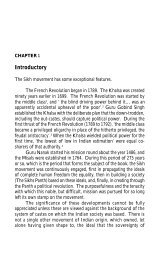Fundamentalism and the Sikh Religious Tradition by T.N. Madan
Fundamentalism and the Sikh Religious Tradition by T.N. Madan
Fundamentalism and the Sikh Religious Tradition by T.N. Madan
Create successful ePaper yourself
Turn your PDF publications into a flip-book with our unique Google optimized e-Paper software.
mantra is of <strong>the</strong> essence <strong>and</strong> supreme, in <strong>Sikh</strong>ism it is only <strong>the</strong> meaning <strong>and</strong> content of<br />
<strong>the</strong> hymn followed <strong>by</strong> deeds which alone are relevant or of any religious value.<br />
This being <strong>the</strong> context, <strong>the</strong> problem in India is not of any contradiction between<br />
Secularism <strong>and</strong> <strong>Sikh</strong>ism, or Secularism <strong>and</strong> Islam, but of implementing Indian<br />
Secularism. <strong>Madan</strong>'s misconceptions are two. He ignores <strong>the</strong> fact that <strong>the</strong> Indian<br />
Secularism <strong>and</strong> Western Secularism are not synonymous terms. The former is a wishful<br />
compromise in a society of religious pluralism. His second misconception is that <strong>the</strong><br />
danger to it is not from <strong>the</strong> minorities but from <strong>the</strong> tradition of <strong>the</strong> majority <strong>and</strong> <strong>the</strong><br />
realities of India's past. <strong>Madan</strong>'s failure appears to be <strong>the</strong> proclivity of <strong>the</strong> Indian mind,<br />
first, to create a new myth, <strong>and</strong>, <strong>the</strong>n, naively to insist that it is a historical truth; <strong>and</strong>,<br />
second, to maintain a rigid objective to recreate <strong>the</strong> traditional past, whenever <strong>the</strong>re is an<br />
opportunity of revival or resurgence. We have already mentioned <strong>the</strong> strict adherence to<br />
Brahminism in <strong>the</strong> Maharata cum-Peshwa rule, in contrast to <strong>the</strong> rule of Ranjit Singh,<br />
which had <strong>the</strong> background of <strong>Sikh</strong> ethos. <strong>Madan</strong> cannot be unaware of <strong>the</strong> fact that after<br />
independence, from <strong>the</strong> Prime Minister down to every Chief Minister was a Brahmin; <strong>and</strong><br />
of <strong>the</strong> shocking knockdown blow to Indian Secularism that was given when, first,<br />
Nariman, <strong>the</strong> undisputed Parsi stalwart of Bombay Congress was unceremoniously<br />
excluded <strong>and</strong> a Hindu was made <strong>the</strong> Chief Minister"" <strong>and</strong> later when as a national<br />
language, Hindustani was given a go-<strong>by</strong>.<br />
Minority experience of Congress Secularism has been far from happy or<br />
reassuring. Although <strong>Madan</strong> perceives no incongruity, when a whole community resorts<br />
to public misstatement, yet his perception remains opaque to <strong>the</strong> facts that it is <strong>the</strong> <strong>Sikh</strong><br />
ideology <strong>and</strong> <strong>the</strong> <strong>Sikh</strong>s, who relieved <strong>the</strong> groaning Indian sub-continent of a thous<strong>and</strong><br />
year wave of oppression, <strong>and</strong> made <strong>the</strong> largest contribution of blood <strong>and</strong> suffering for <strong>the</strong><br />
Independence of India, both in <strong>the</strong> past <strong>and</strong> <strong>the</strong> present. But <strong>the</strong>y <strong>and</strong> <strong>the</strong>ir ideology are<br />
called Fundamentalist. Instead <strong>the</strong> tag of Secularism is placed on those, some of <strong>the</strong><br />
greats of whom, including <strong>the</strong> Fa<strong>the</strong>r of <strong>the</strong> Nation, are not willing to share food at a non-<br />
Hindu's place, <strong>and</strong> apart from officially practising religious discrimination, are trying to<br />
revive <strong>the</strong> Hindu past <strong>by</strong> seeking to build a m<strong>and</strong>ir on <strong>the</strong> site of a mosque. This<br />
insistence on <strong>the</strong> construction of a temple, continues, even though <strong>the</strong> Historical<br />
Committee of <strong>the</strong> Government has reported lack of evidence of a temple <strong>the</strong>re in <strong>the</strong> past.<br />
In contrast <strong>the</strong> <strong>Sikh</strong> tradition is that not only Ranjit Singh gave liberal grants to Muslim<br />
Shrines, but <strong>the</strong> Sixth Master actually constructed a mosque for Muslims in his area.<br />
It would seem that sometimes personal bias is so strong, that one cannot help<br />
giving misinformation, making a blackout of essential happenings <strong>and</strong> events <strong>and</strong><br />
construing <strong>the</strong>m in a manner, which facts do not justify.<br />
Faults <strong>and</strong> Failures of Underst<strong>and</strong>ing : <strong>Madan</strong>'s paper is a classic instance of a<br />
unidisciplinary approach to a subject which is multi-dimensional, especially when it tends<br />
to be dogmatic about doctrines of a religion which has its own ontology, method of study,<br />
<strong>and</strong> history. The author's failure to take into consideration <strong>the</strong> history of religions, <strong>and</strong> of<br />
Judaic mono<strong>the</strong>ism, a miri-piri. system, vitiates his entire underst<strong>and</strong>ing <strong>and</strong><br />
interpretation of <strong>the</strong> doctrines <strong>and</strong> development of <strong>Sikh</strong>ism. To a student of religion it is<br />
well-known that in <strong>the</strong> West, <strong>the</strong> original tradition of mono<strong>the</strong>ism has been of a wholelife<br />
system, <strong>and</strong> monasticism or pacificism are, in fact, later developments, finally leading<br />
to Secularism. Fur<strong>the</strong>r, that, as it happens, in a creative spiritual experience, Guru Nanak<br />
completely departed from <strong>the</strong> dichotomous Indian religious tradition. His second fault,
















